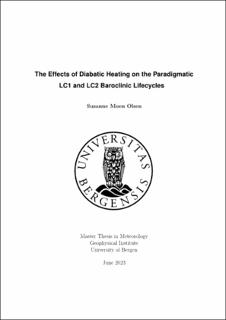The Effects of Diabatic Heating on the Paradigmatic LC1 and LC2 Baroclinic Lifecycles
Master thesis
Permanent lenke
https://hdl.handle.net/11250/3071891Utgivelsesdato
2023-06-01Metadata
Vis full innførselSamlinger
- Master theses [123]
Sammendrag
Extratropical cyclones play a crucial role in determining mid-latitude weather, where the atmosphere is on average inducive to baroclinic instability. Literature has identified two lifecycle behaviors, one that is predominantly anticyclonic (LC1) and one mostly cyclonic (LC2). The lifecycle behavior is strongly influenced by the structure of the zonal mean wind. While baroclinic lifecycles have been extensively studied using dry models, this thesis introduce moisture into the model and focuses on exploring the impact of diabatic heating on the LC1 and LC2 paradigms on an $f$-plane. In addition to the traditional approach of triggering baroclinic wave growth using the most unstable normal mode, we also consider the influence of localized perturbations, which allows for the development of upstream and downstream cyclones. Our investigation contains two parts: first, we examine the effects of diabatic heating using modal perturbed simulations, while in the second part, we explore the impact of diabatic heating on localized perturbed simulations. Our results show that the inclusion of moisture leads to intensified and more rapid cyclone growth. The LC1 lifecycle appears to be the most sensitive to the presence of moisture, with dry simulations primarily favoring anticyclonic development at the surface and minimal cyclone growth until later stages, whereas moist simulations accelerate cyclogenesis at an earlier time. Furthermore, our investigations reveal that higher maximum relative humidity levels amplify the northward transport of moisture.
